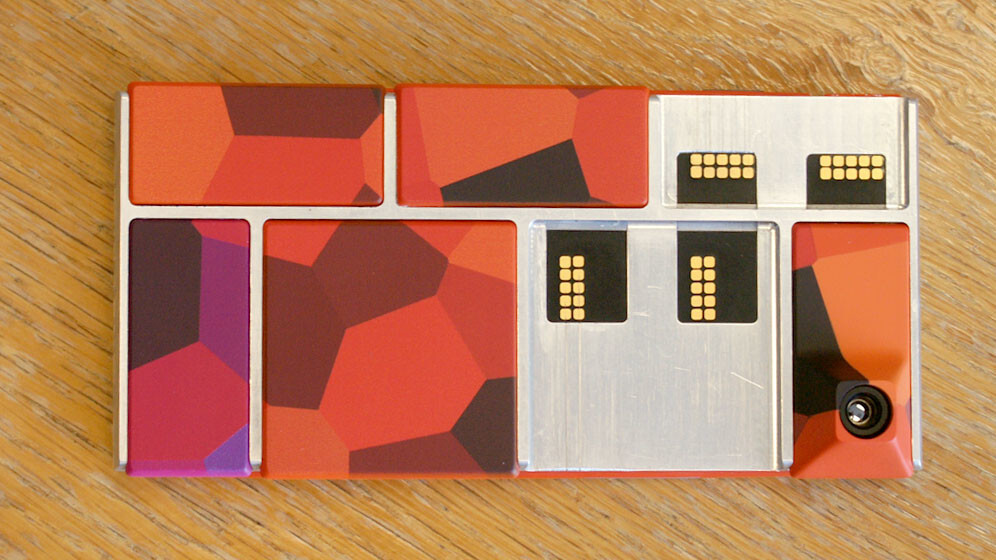
The Project Ara developers conference is Google’s smartphone-experiment show and tell. The search-giant turned hardware-vendor may want to get its new modular smartphone in the hands of the entire world, but it needs to get developers to build the tiny hardware plugins.
Google told The Next Web that there were over 300 attendees and approximately 3,000 concurrent live stream viewers during the opening day of the conference – good start for something that won’t actually ship until sometime in 2015. Many in the audience seemed excited, or at least intrigued by the prospect of developing hardware for a new smartphone platform.
For the developers we talked to, it was less about if they want to develop for the Ara and more when they get to develop their own hardware module. Some already had a good idea what they would be building between now and the launch of the smartphone.
Mike Outmesguine and Alan DeRossett, CEO and CTO of VOXearch respectively are here to see if the Ara modular system will help them win the $10 million Qualcomm Tricorder XPRIZE. The prize will be awarded to the team that creates a handheld medical device (Like the Tricoder in the Star Trek series) that is capable of diagnosing 15 diseases and capturing health data. VOXearch envisions an Ara Endo filled with health-related modules. The modules could be mixed and matched depending on the region in which the ARA is sent. “A group in Africa that needs a Malaria test could get a module for that,” says DeRossett.
One factor that makes the Ara ideal as a regional medical device is its light weight and small form factor. Using Matternet–a drone delivery system for areas without or a limited transportation infrastructure–a VOXearch module or full Ara phone could be delivered to those most in need to medical diagnosis.
In addition to the medical field, the Ara also appeals to the Maker crowd. Especially 13 year-old Arduino wunderkind Quin Etnyre. The Central California Coast developer and Arduino instructor wants to develop tiny Arduino and Raspberry Pi implementations for the device. Etnyre already builds his own PCBs (Printed Circuit Boards) for his company.
Etnyre is a big fan of the ability to implement modules fit into your lifestyle and the openness of the platform.

University of Florida student Daniel Collotte is also a fan of an open smartphone platform. “There are all these lockdowns on current smartphones. You can add hardware, but it’s usually a workaround. The Square Reader is probably the most advanced hardware add-on right now,” he said.
Collotte, a participant in the MAKEwithMOTO traveling phone-hacking event, is interested in a few module ideas. One includes an IR module that can control your TV. But, he also thinks that Google could lower the barrier to prototyping modules by allowing small developers to team up on materials like black solder mask that could be difficult to purcahe in small quantities.
When these modules are finally ready to be shipped they will be sold via Google’s upcoming Ara module online marketplace. Sosolimited studio is tasked with making that experience as user friendly as possible. The studio is working with the ATAP group to create the Project Ara Android app. Co-founder Eric Gunther say that the company is, “currently in the thick of it trying to figure out an intuitive way for users to work with all parts in the app.” In addition to being a portal into the module store, the app–working title, The Configurator”– will have to recreate Ara hardware digitally so users know how it will work within their phone. It’s currently doing motion studies to determine the best way to show modules going in and out of an Endo.
With Sosolimited’s app and the developers currently excited about the platform, Project Ara could be the next step in the evolution of the smartphone. Google just needs to keep the excitement building and development going forward. These modules will be the hardware equivalent of apps. Google will need an Ara marketplace full of modules consumers want for the phone to succeed. All the next generation awesomeness means nothing if there’s nothing worth buying.
Get the TNW newsletter
Get the most important tech news in your inbox each week.




